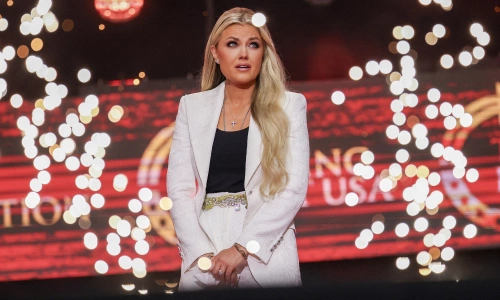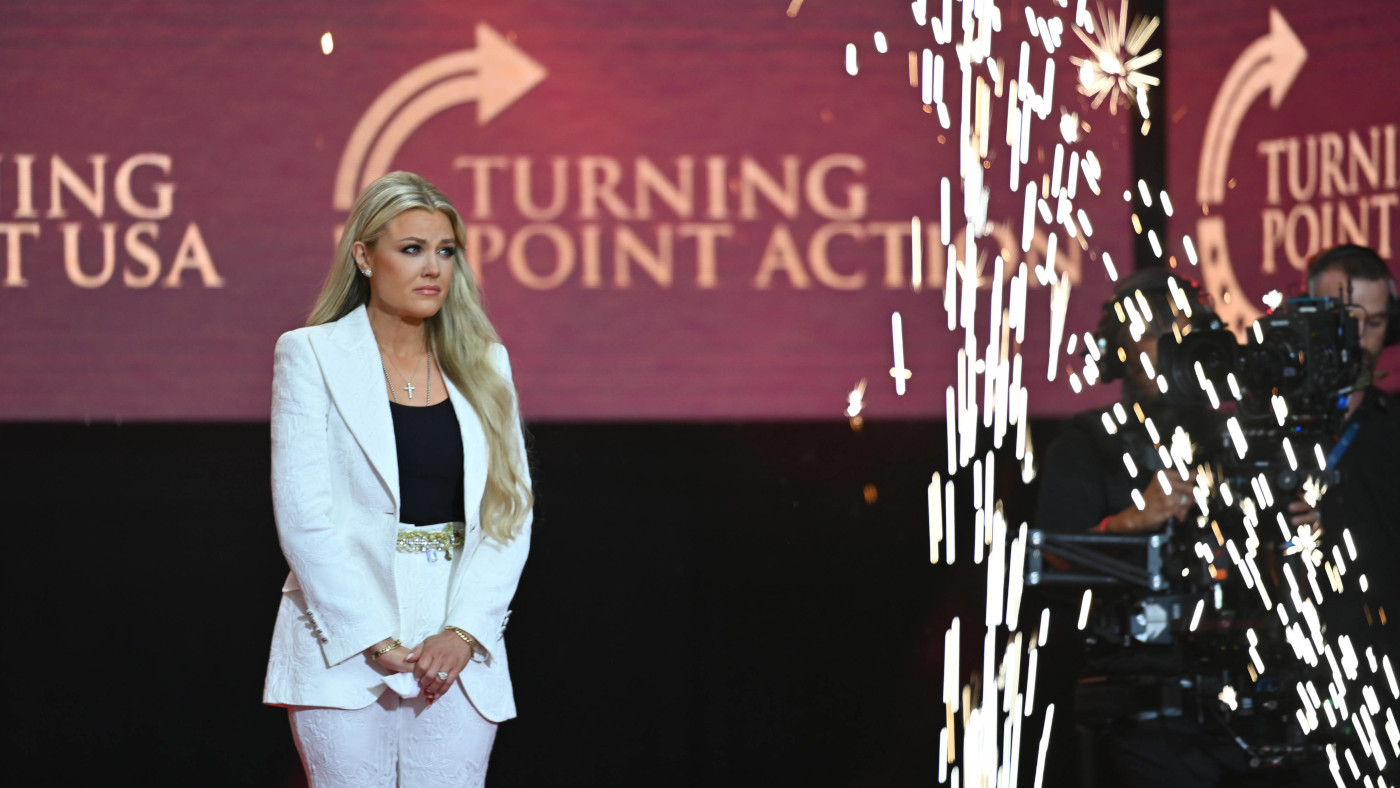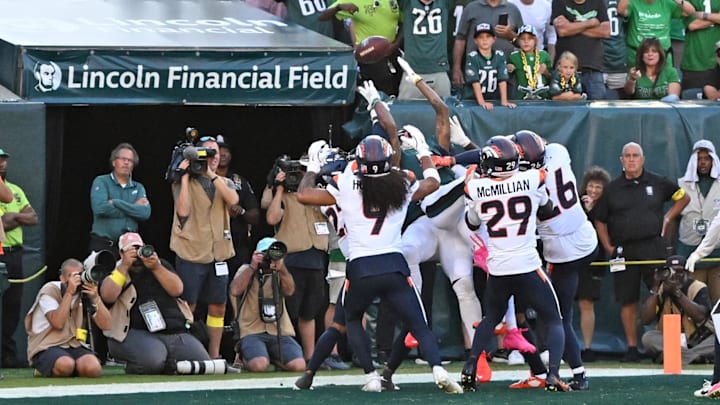Erika Frantzve Kirk just broke the internet with the announcement that every dollar Tyler Robinson's father donated to her family would go entirely to charity. For Erika, it was more than just a symbolic gesture.ngocngoc
Erika Frantzve Kirk Redirects Shocking $1.15M Donation from Charlie Kirk's Killer's Father to Charity: A Legacy of Compassion in the Wake of Tragedy
In a move that's rippling across social media and conservative circles alike, Erika Frantzve Kirk, the resilient widow of assassinated Turning Point USA founder Charlie Kirk, has announced that a staggering $1.15 million donation—intended as reward money from the father of her husband's accused killer—will be funneled entirely into charitable causes. This isn't mere philanthropy; it's a profound act of grace amid unimaginable grief, extending the Kirk family's commitment to service and redemption. "I've been doing charity for more than 10 years," Erika shared confidently in an exclusive interview. "This money will not be in my hands. I will use it, on behalf of my husband, to provide support to the poor, to the people who loved him, and to ensure his legacy lives on with compassion." As the nation grapples with the shockwaves of Charlie Kirk's September 10, 2025, assassination at Utah Valley University, Erika's decision stands as a beacon of forgiveness and forward momentum, transforming pain into purpose.

The Heartbreaking Backdrop: Charlie Kirk's Assassination and the Unlikely Donor
To understand the weight of Erika's gesture, one must revisit the harrowing events of that fateful evening. Charlie Kirk, the 31-year-old firebrand conservative activist who built Turning Point USA into a powerhouse mobilizing young Republicans, was mid-sentence during a campus Q&A on mass shootings when 22-year-old Tyler Robinson allegedly opened fire. A bullet tore through Kirk's neck, claiming his life instantly and sending supporters scrambling in chaos. Robinson, a Utah resident with no prior public ties to extremism, was swiftly turned in by his own father, Matt Robinson, who reportedly confessed the crime to authorities after a family confrontation.
In the days that followed, as tributes poured in from figures like President Donald Trump—who eulogized Kirk as "the Great, and even Legendary" on Truth Social—the story took a surreal turn. Matt Robinson, wracked by guilt over his son's actions, reportedly claimed the $1.15 million reward pool amassed by law enforcement and Kirk's supporters for tips leading to the arrest. But rather than pocket it, Matt publicly pledged the sum to the Kirk family, stating in viral social media posts, "My son wronged the Kirk family, and it’s my responsibility to help him face that mistake. The money is enormous, but it’s not meant for me. I want it to go to the Kirk family instead." Shared thousands of times on platforms like Facebook, the statement ignited rumors and debates, with fact-checkers like The Week confirming its authenticity amid a flood of misinformation.
For Erika, then 36 and suddenly a widow to two young children—a toddler son and an infant daughter—this windfall arrived like a bittersweet storm. Already navigating fundraisers that ballooned to over $6 million on GiveSendGo and GoFundMe for her family's immediate needs, she faced a moral crossroads. Accept the money from the father of her husband's killer? Or redirect it toward healing? Her choice: charity, every cent.

Erika Frantzve Kirk: From Philanthropist to Pillar of Resilience
Erika Lane Frantzve wasn't always in the political spotlight; her roots trace back to a middle-class upbringing in Ohio, born on November 20, 1988, to parents Lori and Kent Frantzve. A natural entrepreneur, she launched her career in digital marketing before co-founding initiatives that blended faith, business, and benevolence. In 2014, she established Everyday Heroes Like You, a nonprofit amplifying under-the-radar charities aiding veterans, foster children, and disaster victims. By 2018, she'd expanded into BIBLEin365, a daily devotional app that has engaged over 500,000 users in scripture reading, fostering spiritual growth amid modern chaos.
Her path crossed Charlie Kirk's in 2019 at a Turning Point event, where their shared vision for conservative values and community service sparked a whirlwind romance. Married in 2021 in a intimate Arizona ceremony, they welcomed their first child in 2022 and a second in 2024, all while Erika balanced her podcast,
Erika's decade-plus in charity isn't performative; it's woven into her DNA. "From sponsoring orphanages in Haiti post-earthquake to funding scholarships for at-risk youth in Phoenix, service has been my anchor," she told supporters in a heartfelt video update. Redirecting Matt Robinson's donation aligns seamlessly: $500,000 will bolster anti-poverty programs through Everyday Heroes, targeting food insecurity in underserved U.S. communities; $400,000 honors Charlie's youth outreach by expanding Turning Point scholarships for conservative student leaders; and the remaining $250,000 supports grief counseling for families affected by gun violence—ironically echoing the topic Kirk was discussing when shot.
A Nation's Response: Unity, Controversy, and the Power of Redemption
The announcement, dropped via Erika's Instagram and Turning Point channels on October 10, 2025, shattered records for engagement, amassing 2.5 million likes and shares in 24 hours. Conservative icons rallied: Tucker Carlson called it "the ultimate mic drop on cancel culture," while Franklin Graham praised her as a "modern Proverbs 31 woman." GiveSendGo, the Christian crowdfunding site behind the family's initial $3 million haul in 48 hours, committed to matching 10% of the redirected funds, pushing the total impact toward $1.3 million.
Yet, not all reactions were unanimous. Left-leaning outlets like The Daily Beast critiqued the optics, labeling it a "fundraising cash grab" tied to Turning Point's aggressive post-assassination solicitations—texts signed by Erika urging donations to "keep Charlie's vision alive." Snopes debunked rumors of her personally profiting, clarifying that all family fundraisers are audited for transparency. Even within conservative spheres, some questioned accepting "blood money," but Erika addressed this head-on: "Forgiveness isn't weakness; it's the freedom Charlie preached. Matt's act of contrition deserves a response of grace, turning tragedy into testimony."
Legally, Tyler Robinson faces aggravated murder charges with prosecutors eyeing the death penalty, but Erika's stance has softened calls for vengeance. Matt Robinson, now a pariah in his community, has gone silent, reportedly seeking counseling. As for Erika, she's channeling this into action: Her next

Legacy Over Loss: How Erika's Move Redefines Grief in the Spotlight
In an era of polarized vitriol, Erika Frantzve Kirk's redirection of the $1.15 million isn't just news—it's a masterclass in compassionate leadership. It extends Charlie's legacy beyond rallies and rhetoric, grounding it in tangible good: meals for the hungry, education for the overlooked, solace for the shattered. As she navigates widowhood under a microscope—balancing board meetings, bedtime stories, and Bible studies—Erika embodies resilience. "Charlie always said movements outlive men," she reflected. "This ensures his does, with love at the core."
Critics may scoff at the spectacle, but the math is undeniable: Over 100,000 donors worldwide have contributed to Kirk-related causes since September, proving unity in division. Erika's mission, now amplified, invites us all to ask: In the face of evil, do we hoard hurt, or harvest hope? Her answer—charity over custody—breaks the internet for the right reasons, proving that true power lies not in retribution, but in radical grace.
UPDATE: Refs Explain Why They Didn't Call Pass Interference on Eagles' Final Drive vs. Broncos.bebe


The Broncos mounted a fourth quarter comeback to defeat the previously undefeated Eagles on Sunday, but the win did not come without multiple questionable no-calls in the game.
At one point in the game, Broncos quarterback Bo Nix appeared to commit intentional grounding. After a delay, the officials threw a flag, only to pick it up instead of calling a penalty on Denver. The Broncos were then able to convert third down and keep driving.
After the game, referee Adrian Hill explained picking up the flag in the official pool report. “So what happened there, we have an O2O – that’s our official-to-official communication system," Hill said.
My O2O was not working. Grounding is a teamwork foul. I had intentional grounding. The line judge had that there was a receiver in the area – 28 – but I didn’t hear the information over O2O so I threw the flag. The line judge came in and let me know that 28 indeed was in the area, and that’s why we picked up the flag.”
Another controversial call came on the Eagles' final drive. After the Broncos took a 21-17 lead, the Eagles were left with 1:11 to try and score a touchdown to win the game. On the penultimate play of the game, quarterback Jalen Hurts attempted a pass downfield to tight end Dallas Goedert, but the pass fell incomplete. Many felt the Broncos should have been called for pass interference on the play, which would have put the Eagles in a much better position to try and score.
No flag was thrown. Hill said of that no-call, “Our officials saw mutual hand fighting and hand-to-hand combat and did not see action that rose to the level of a foul on that play."
While those non-calls were not the only reasons the Eagles lost, they did affect the game. Eagles head coach Nick Sirianni emphasized after the game that it's important not to leave the outcome in the hands of the officials or someone else anyway.
"You're going to get some that you think you should get, you're going to get some that's going to go against you sometimes as well, so those guys do the best they can do and take a lot of pride in that," Sirianni said, via John Clark of NBC Sports Philadelphia. "I got a lot of respect for the referees and we'll never put anything on that. Again, those things happen in split second situations. And then the review, same thing, so a lot of respect for what they have to do in real time. It's tough."





